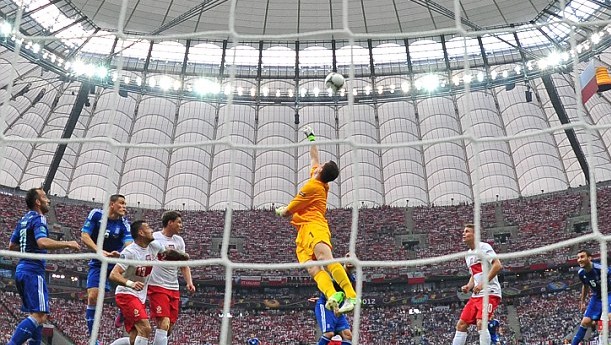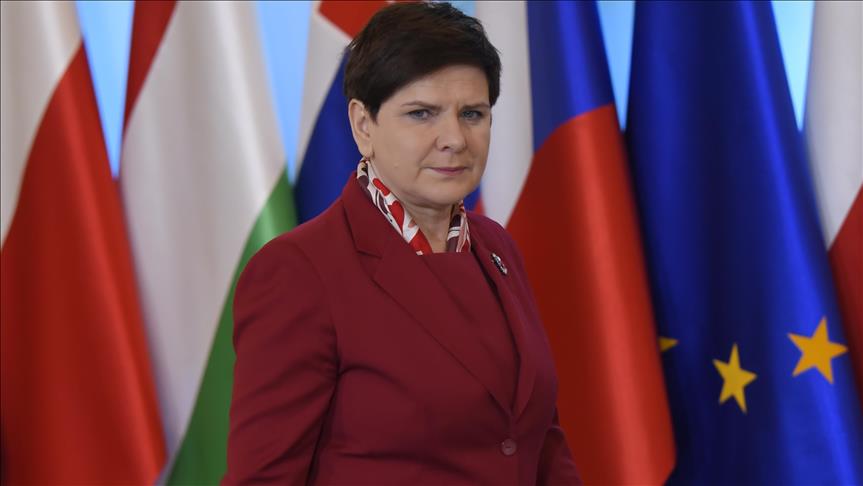The first game of Euro 2012 broke with the tradition for the opening night of a major football tournament. It was breathlessly entertaining.
It was the start to a tournament that the organisers might pretend to find distasteful, but at least it wasn’t dull. There was disorder and the Arsenal goalkeeper Wojciech Szczesny received a red card in the second half to go with the one for Greece’s Sokratis Papastathopoulos in the first, but then Szczesny’s replacement, Przemyslaw Tyton, saved Giorgos Karagounis’s weak penalty.
The powers that be cannot be enthusiastic about some of the action here, but if there was any question about the profile of Euro 2012 they were removed. In time, of course, Poland may feel somewhat regretful. They had it in mind to galvanise their countrymen, but the side were not masters of the occasion. Greece had been insistent on showing that they had means of their own that can tell in Poland and Ukraine. It is the hosts who may be left to reflect on these scenes.
Poland supporters would have been unsure whether to settle simply for enjoying the Euro 2012 ambience or hoping for spectacular results. An opener from the Borussia Dortmund attacker Robert Lewandowski as early as the 17th minute seemed to encapsulate the vibrancy his side was intent on maintaining, but mayhem also played its place.
Greece had their moments, but this occasion sometimes seemed to be too great for them. Poise was lost when the centre-half Papastathopoulos was sent off with a second yellow card by the Spanish referee Carlos Velasco Carballo in the 44th minute, although the obstruction then and the earlier offence had been unremarkable
So far as Poland were concerned, this will be a particularly tough competition. If hope and expectation have climbed it is largely because of Lewandowski and the other two Poles who lately contributed to Dortmund’s completion of the Double.
Those exploits, all the same, could also have cast a shadow over Franciszek Smuda’s squad. The feats of the attacker Lewandowski in Germany might, in theory, have siphoned off much of his energy, even if this tournament could be the experience of a lifetime for a footballer easing himself into the peak years of his career.
If he was to be galvanised immediately, this grand occasion had to cram the national stadium with fervour and faith.
Even so, there would have been little expectation of uninhibited play by the Poland side as a whole. Smuda, weighing up his squad, has a preference for caution. Poland had kept five clean sheets in a row before this encounter.
The natural retort would be that they had been dealing in irrelevancies while mere friendlies made up the fixture list. Smuda could have insisted that a rapport and purpose were being introduced all the same.
This game might have been designed to test Poland’s true capacity. Nothing was likely to come easy considering that a stubborn Greece were undefeated in the qualifiers. The hosts were in no doubt that it would take vigour and sustained purpose to alarm Greece. The opening was bold, with Greece stretched as Poland took the initiative immediately.
Szczesny didn’t have too much trouble in tipping away Rafal Murawski’s drive from the edge of the area after four minutes, yet the incident raised expectations among the Polish support. It was not lost on Greece that resistance alone would not suffice and the centre-forward Theofanis Gekas had headed beyond the far post following a set-piece from the captain Giorgos Karagounis.
The confidence of Poland from kick-off, however, kept on taxing Greece. Lewandowski’s opener felt overdue even if it was notched with a mere 17 minutes gone. Poland, in a pleasingly old-fashioned way, took to the wings as they made he breakthrough.
The captain Jakub Blaszczykowski delivered from the right and, with the Greece goalkeeper Kostas Chalkias tentative in his reactions, Lewandowski headed home decisively. It was an episode that raised questions about how Greece could react, considering that resilience is a key attribute. They did begin to enjoy more possession, but Poland, with the lead, were also able to pace themselves and turn to their minds to the possibility of punishing the opposition with counter-attacks. It was probably the approach Greece would have adopted had it not been for Lewandowski’s impact.
Szczesny was wrong-footed by the defender’s unnecessary interception.
Even so, they were not to be cowed. An equaliser came in the 51st minute as a cross by Vassilis Torosidis from the right was not dealt with by Szczesny, who was impeded by his own defender, and Dimitris Salpingidis, the substitute, turned the ball home.
Greece may have been outnumbered but were scarcely discouraged at that stage. The eventfulness of the match gave it a spasmodic tone. Schemes devised so carefully by coaches felt like an irrelevance. If Greece were at ease for a while despite lacking the full complement of players, it did not pose instant alarm. The angst lay with Poland who watched Maciej Rybus head wide and matters seemed to deteriorate with the red card for Szczesny.
The Arsenal goalkeeper made a poor challenge to bring down Salpingidis, but his replacement Tyton then saved the penalty from Karagounis. It was a madcap night that set the tournament off with a remarkable fixture.
[adrotate banner=”48″]



